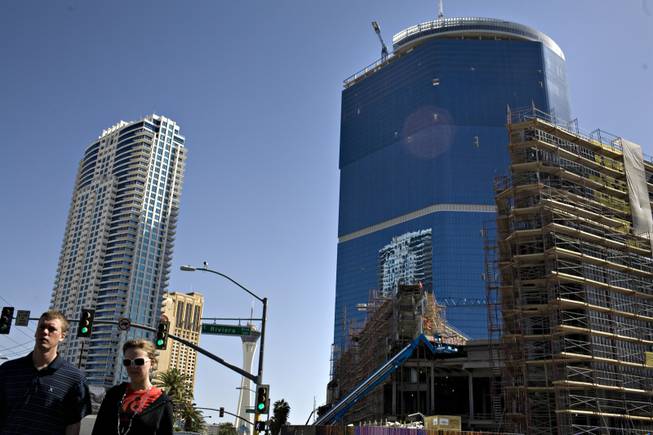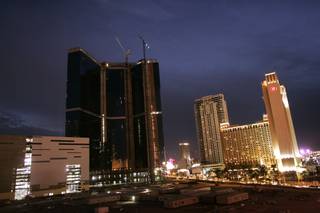
A lawsuit brought by officials of the Fontainebleau Las Vegas, pictured at right Tuesday, accuse lenders of breaking the terms of an $800 million loan agreement. Fontainebleau committed “one or more events of default,” Bank of America says.
Wednesday, April 29, 2009 | 2 a.m.
Fontainebleau Lawsuit
Another Strip project is in danger of shutting down. Find out what the future holds for Fontainebleau. Plus, two banks with a presence in Las Vegas report First Quarter earnings.
Related Document
Sun Archives
Sun Coverage
Beyond the Sun
Fontainebleau Las Vegas
Legal experts say the banks attempting to back out of their commitment to finance the Fontainebleau Las Vegas might defend their decision by arguing the economic downturn that has created doubts about the project’s future is an act of God.
Fontainebleau has sued the banks, accusing them of breaking the terms of the $800 million loan agreement.
If it lands in court, the case could come down to the interpretation of the financing contract’s “material adverse change,” or MAC clause, the experts say. The clause gives lenders the right to terminate a loan before a project is completed for “any event or circumstance which has a material adverse effect on the business, assets, properties, liabilities (actual or contingent), operations or condition (financial or otherwise) of the companies, taken as a whole,” according to the Fontainebleau loan agreement, obtained by the Sun.
Definitions of what constitutes such an event — sometimes referred to as an act of God — are vaguely worded and often lead to intractable disputes, experts say.
“Companies will fight over what this means,” said Andy Gabriel, a commercial real estate attorney with McDonald Carano Wilson, which is not involved in the lawsuit.
One analyst, who asked not to be identified and is not connected to the Fontainebleau or its loans, said such clauses aren’t meant to apply to economic downturns. Rather, they are intended to apply to fires, floods, terrorist attacks and other events that cannot be anticipated by financial models.
“It would be idiocy for the banks not to include the ups and downs in business cycles in their analysis,” the analyst said. “It’s their job to analyze business risk. If an economic downturn can affect your loan, it’s not much of a commitment, then, is it?”
In its lawsuit, Fontainebleau says it attempted in March to draw $670 million available under its revolving loan, along with another $350 million available under a term loan. Bank of America refused and Fontainebleau resubmitted its request, this time arguing that the revolving funds, according to the loan agreement, should be made available once the term loan was fully drawn. Bank of America refused again and Fontainebleau eventually requested only the amount available under the term loan.
Fontainebleau’s request for money from the revolving line of credit may have been interpreted by the banks as a sign of trouble ahead, especially if Fontainebleau were to use the money to fund construction costs not anticipated in the original budget, financial experts say.
With earnings at some major Las Vegas casinos cut in half, room rates at historic lows and more than 10,000 additional hotel rooms expected to cannibalize business from Strip properties, the banks involved in the Fontainebleau loan in question have cause to worry.
Fontainebleau lenders Bank of America, Barclays Bank, Deutsche Bank and Royal Bank of Scotland already have lent money to Las Vegas casino companies at risk in the recession. Fontainebleau was financed before the economic meltdown, when many Las Vegas casinos were generating record profits.
Analysts say Fontainebleau presents a bigger financial risk than resorts built by other Las Vegas gaming giants, such as MGM Mirage’s CityCenter and Boyd’s Echelon, because it doesn’t have as large a customer list to draw from.
Fontainebleau officials have declined to discuss specifics of the loan agreement between the banks and the developer, which is confidential. In an April 20 letter to Fontainebleau Las Vegas Chief Financial Officer Jim Freeman, Bank of America — which arranged the $800 million loan among the banks — said Fontainebleau committed “one or more events of default” but does not elaborate.
However, during a private conference call last week among banks involved in the Fontainebleau loan, a representative of Bank of America said Fontainebleau had breached at least four elements of the loan agreement, according to a source familiar with the discussions who asked not to be identified. The alleged breaches mentioned included the test of “material adverse change” and representations of what Fontainebleau would cost to finish.
Also cited during the call was an “insolvency test,” which measures the fair market value of a project’s expected earnings as compared with its debts. Among other gloomy predictions of the Fontainebleau’s future, bond rating agency Standard & Poor’s said in February that Fontainebleau earnings after opening are expected to fall short of interest payments on the property’s debt, in part based on lackluster demand for condos. Fontainebleau hoped to raise as much as $800 million from the sale of more than 1,000 condo-hotel units.
The bank representatives also discussed an “in balance test,” a monthly examination of whether a project has as much money going in the door as it does going out. During the conference call the banks noted that Fontainebleau was “in balance” on March 25, when the company drew money from a term loan.
This month Fontainebleau notified lenders that the remaining costs needed to complete the project “appeared to exceed the available loan funds” and that the company likely wouldn’t pass the “in balance” test as required by the lenders.
Failure to pass the test does not constitute a default of the loan agreement, the lawsuit contends. “At most, it only delays the ability to draw funds,” it continues.
Bank of America spokeswoman Shirley Norton said Tuesday that the bank “continues to have discussions with Fontainebleau Las Vegas regarding a structured financing for the project.” She declined to comment further on the lawsuit.
Fontainebleau spokesman David Satterfield on Tuesday described the discussions as “constructive.”
“We expect (the banks) to abide by their contractual commitment and fund the $800 million we need to get this project completed,” he said.
Banks can’t simply walk out on their obligations unless the borrower breaks its end of the deal.
An argument that the banks could not have foreseen a recession wouldn’t stand up in court, the analysts said. It would also make the banks look incompetent, according to the analysts.
Another local attorney familiar with such loan agreements, who is not involved in the case, says invoking a MAC clause can tarnish a bank’s reputation. That’s why banks rarely invoke the clause — not even after the Sept. 11, 2001, terrorist attacks, when fears that banks would renege on loans were widespread, the attorney said.
“There’s so little case law out there as to what constitutes a MAC that you’re walking into pretty unknown territory,” the Las Vegas attorney said.
“I haven’t yet seen banks using this as a reason ... but this would be the type of lending environment where you might see this happen,” Gabriel added.


Join the Discussion:
Check this out for a full explanation of our conversion to the LiveFyre commenting system and instructions on how to sign up for an account.
Full comments policy